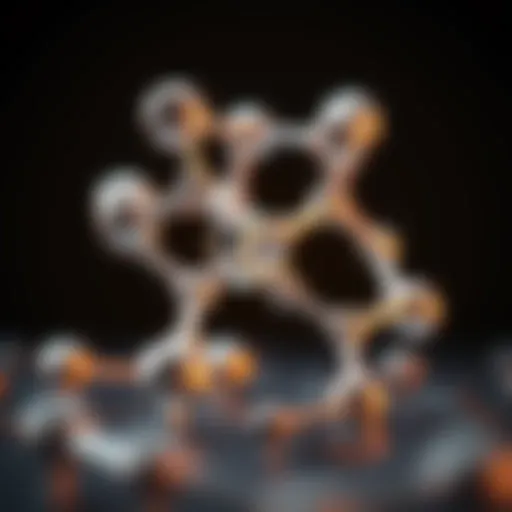Understanding Fatigue in Breast Cancer Patients


Intro
Fatigue commonly emerges as a significant symptom for patients with breast cancer. This condition often presents adversarial challenges in daily life, affecting both physical and emotional well-being. Patients frequently describe it as an unrelenting state of exhaustion that does not improve with rest. Understanding fatigue in the context of breast cancer is essential for both professionals and caregivers.
The complexity of fatigue arises from its numerous potential causes, including the cancer itself, treatments like chemotherapy and radiation, hormonal changes, and psychological factors. Patients may not always communicate their fatigue effectively, which can lead to oversight in managing their overall health.
Recent Advances
The understanding of fatigue related to breast cancer has advanced significantly over recent years, primarily through rigorous research and clinical observations.
Latest Discoveries
Recent studies have identified distinct patterns of fatigue unique to breast cancer patients. For instance, researchers have discovered that fatigue may have a cumulative effect, worsening with treatment cycles. Evidence suggests that it is not merely a physiological response but can also stem from psychological stressors such as anxiety and depression. Clinical trials have demonstrated correlations between higher levels of fatigue and specific treatment regimens.
Some researchers are focusing on biomarkers to better understand fatigue. Identifying specific biological markers associated with extreme fatigue may allow for tailored treatment plans. This shift from general symptom management to a targeted approach is significant.
Technological Innovations
Technological innovations have emerged in monitoring fatigue. Wearable devices, for example, can track physiological responses, aiding in the assessment of a patient's fatigue levels throughout treatment. These tools can provide real-time data to healthcare providers, facilitating personalized care approaches.
Telehealth has also improved the communication between patients and caregivers, allowing for regular check-ins concerning fatigue levels. This innovation ensures that fatigue is not overlooked in treatment discussions.
> "Fatigue in breast cancer is more than just tiredness; it demands a comprehensive approach to management that encompasses physical, emotional, and technological perspectives."
Methodology
Understanding fatigue requires a comprehensive approach incorporating diverse research designs and data collection techniques.
Research Design
Many studies employ longitudinal designs to track fatigue over time in breast cancer patients. This approach allows researchers to see how fatigue levels change in relation to treatment timelines, providing valuable data on the progression of symptoms.
Data Collection Techniques
Data on fatigue is collected using various methods, including self-reported questionnaires, interviews, and direct observations. Standardized tools like the Functional Assessment of Chronic Illness Therapy (FACIT) Fatigue Scale are commonly used. This method ensures consistency in data and allows for comparative analysis across different patient groups.
Prelims
Fatigue is a significant yet often neglected symptom in breast cancer patients. This article focuses on the multifaceted nature of fatigue as it relates to breast cancer and the implications it has on patient care. Understanding fatigue is crucial for healthcare providers to deliver comprehensive and effective treatment.
In exploring this topic, several key elements are considered. We will examine the definition of cancer-related fatigue, its prevalence specifically in breast cancer, and the physiological and psychological mechanisms behind this condition. Addressing fatigue not only improves the quality of life for patients but can also enhance their overall treatment outcomes.
Understanding Fatigue
Fatigue is more than regular tiredness. It is a complex symptom that can affect physical, emotional, and mental states. Many cancer patients describe their fatigue as an overwhelming sense of exhaustion that is not relieved by rest. Understanding this feeling is essential. It impacts daily activities, mental health, and overall wellness. Fatigue can stem from various factors including disease progression, treatments like chemotherapy, medications, and even emotional responses to a cancer diagnosis. This section will lay the groundwork for further discussions.
Breast Cancer Overview
Breast cancer is one of the most common cancers diagnosed worldwide. It can affect individuals physically and emotionally. Treatment regimens often include surgery, chemotherapy, radiation, and hormone therapy. Each of these treatments can lead to fatigue, compounding the challenges faced by patients. This overview highlights that fatigue is not just an isolated issue but rather a symptom that can have serious implications for patients navigating breast cancer.
The Nature of Fatigue in Cancer Patients
Fatigue is a prominent symptom among cancer patients, particularly those with breast cancer. Understanding the nature of fatigue in this context is essential for approaching treatment and care holistically. Fatigue is not just an emotional or physical state; it is a complex interplay of biological, psychological, and social factors that intertwine uniquely in the cancer journey.
Healthcare professionals and caregivers must acknowledge and address this symptom to enhance the quality of life for patients. Failure to recognize fatigue can lead to mismanagement and increased distress. Therefore, analyzing both its definition and prevalence provides foundational knowledge for effective patient care and treatment management.
Definition of Cancer-Related Fatigue
Cancer-related fatigue is a multifaceted syndrome that extends beyond general tiredness. It is characterized by profound physical, emotional, and psychological exhaustion that is not relieved by rest. According to the American Society of Clinical Oncology, fatigue can stem from cancer itself as well as treatments, like chemotherapy and radiation.
Patients often describe it as a lack of energy, which can impact their ability to carry out daily tasks or even engage in social interactions. The presence of fatigue may complicate treatment protocols and can negatively influence a patient’s overall outlook, potentially affecting adherence to prescribed therapies.


Factors contributing to cancer-related fatigue include:
- Biological changes within the body due to the cancer itself.
- Treatment side effects, which may include anemia, sleep disturbances, and pain.
- Psychological elements such as stress, anxiety, or depression.
- Nutritional deficiencies impacting energy levels.
Prevalence in Breast Cancer
In the realm of breast cancer, the prevalence of fatigue is alarmingly high. Studies suggest that as many as 80% of women diagnosed with breast cancer experience some form of fatigue during treatment and recovery. This statistic highlights a significant gap in awareness among patients and healthcare providers.
Fatigue often peaks during treatments, particularly chemotherapy, and may persist well after the completion of therapy. Longitudinal studies indicate that for some patients, the effects of fatigue can last for years. This chronic fatigue can severely diminish not only the quality of life but also the effectiveness of continued treatment regimens.
Notably, individual experiences vary widely based on factors such as:
- Stage of cancer at diagnosis.
- Types of treatments undergone.
- Presence of comorbid conditions.
- Individual emotional resilience.
Recognizing high prevalence rates can improve healthcare outcomes. Increased awareness is fundamental for better screening, diagnosis, and management of fatigue in breast cancer patients.
"Addressing fatigue is crucial in the holistic management of breast cancer, as it affects every aspect of a patient’s life, from treatment adherence to overall well-being.*
Physiological Mechanisms of Fatigue
Understanding the physiological mechanisms behind fatigue in breast cancer patients is crucial. Fatigue can direct impact quality of life, treatment compliance, and overall health outcomes. This section aims to elucidate the biological factors that contribute to fatigue, providing insights into why this symptom is prevalent among these patients. Addressing these mechanisms is essential for developing personalized treatment approaches and improving patient care.
Biological Markers of Fatigue
Biological markers refer to measurable indicators that can help to identify fatigue's presence and severity in patients. These markers can be hormones, cytokines, or other molecules circulating in the body. Research suggests that certain biomarkers, such as Cortisol and serum cytokines like IL-6 and TNF-alpha, may correlate with levels of fatigue. High levels of these cytokines are often present in cancer patients and have been associated with various disease processes.
Moreover, studies using fatigue-related assessments commonly measure these markers. Understanding these biological cues can potentially lead to better-targeted interventions to manage fatigue effectively. Regular monitoring of these markers can also help clinicians to adapt treatment plans in response to changes in fatigue levels.
Inflammation and Fatigue
Inflammation plays a significant role in the fatigue experienced by breast cancer patients. The body’s natural response to cancer or infection often involves inflammatory processes that can lead to a state called Systemic Inflammatory Response Syndrome (SIRS). Such a state can contribute immensely to feelings of tireness and insufficient energy.
Chronic inflammation has been connected to fatigue in numerous studies. In breast cancer, inflammation arises from tumor activity and alongside treatment modalities like chemotherapy. It not only alters metabolic regulation but also can disrupt sleep patterns, which further exacerbates fatigue symptoms.
Key points to consider about inflammation and fatigue:
- Immune Response: The immune system produces pro-inflammatory cytokines to combat cancer cells. Unfortunately, these same molecules can lead to fatigue as a side effect.
- Impact on Sleep: Inflammatory processes can disrupt sleep, worsening fatigue over time.
- Connections to Depression: Inflammation may also correlate with depression, a condition commonly seen in cancer patients, further complicating their experience of fatigue.
Effective management of inflammation could be a crucial step in alleviating fatigue for breast cancer patients.
In summary, recognizing the physiological mechanisms of fatigue is pivotal in comprehending how breast cancer affects individuals. Understanding biological markers and the role of inflammation is fundamental to designing effective treatments. This knowledge offers pathways to mitigate fatigue, enhance well-being, and improve overall patient care.
Psychological Factors Influencing Fatigue
Understanding the psychological factors influencing fatigue is crucial in the context of breast cancer. Fatigue is not only a physical symptom but also deeply intertwined with emotional and psychological health. Addressing these factors can significantly enhance overall patient well-being and lead to more effective management strategies.
Emotional Impact of a Breast Cancer Diagnosis
A breast cancer diagnosis can be a life-altering event. Many patients experience a range of emotions such as fear, anger, and despair. The emotional toll is not trivial; it can manifest physically as fatigue. Patients often wrestle with uncertainty regarding treatment outcomes and the future of their lives.
This emotional strain can lead to chronic stress, which is known to contribute to feelings of fatigue. When individuals are emotionally taxed, their bodies respond with fatigue as a way to signal the need for rest and recovery.
Furthermore, the shock of the diagnosis may disrupt normal routines, including sleep patterns and physical activity. These disruptions can further exacerbate feelings of tiredness. It is important for both healthcare providers and caregivers to recognize the emotional burden that accompanies a diagnosis. By providing emotional support and resources, the negative impact on fatigue can potentially be reduced.
Mental Health and Fatigue Correlation
The correlation between mental health and fatigue is well-documented. Studies indicate that individuals with depression or anxiety are more likely to report higher levels of fatigue. For breast cancer patients, existing mental health conditions may worsen during treatment phases due to added stressors.
Moreover, medication for depression or anxiety can also contribute to fatigue. Patients may experience side effects that intensify feelings of tiredness or lethargy. Understanding this relationship is vital for healthcare professionals in formulating treatment plans.
"Fatigue is a complex phenomenon influenced by psychological health, making it crucial to address mental well-being alongside physical treatment."


Patients may also feel guilt or frustration about their fatigue. This can lead to a cycle where fatigue affects their mood, which in turn exacerbates fatigue. Therefore, mental health support is essential. Programs that offer counseling or group support can aid patients in navigating their emotional landscapes. By integrating mental health care into treatment plans, patients may better manage fatigue, thus improving their quality of life.
Treatment Modalities and Fatigue Management
Fatigue is a significant symptom in breast cancer patients, affecting their quality of life. It is crucial to focus on treatment modalities and effective fatigue management strategies. Addressing fatigue not only enhances patients’ overall well-being but also supports their ability to handle treatment and maintain daily activities. Managing fatigue is a multi-faceted approach that combines pharmacological and non-pharmacological strategies, providing a more comprehensive care plan for breast cancer patients.
Pharmacological Interventions
Pharmacological interventions are one way to address fatigue in breast cancer patients. Healthcare providers often prescribe medications such as stimulants, antidepressants, or corticosteroids. These medications have shown to help in reducing fatigue by altering neurochemical processes in the brain.
However, the use of pharmacological solutions must be done cautiously. There are potential side effects, and these medications do not work for everyone. For instance, while stimulants can increase energy, they might also lead to insomnia or increased anxiety.
Regular consultations with healthcare providers are essential to ensure these medications are appropriate for individual cases, tailoring treatment plans according to patients’ specific needs.
Non-Pharmacological Approaches
Non-pharmacological methods play a vital role in managing fatigue. They encompass a variety of strategies, which are often more holistic and consider the patient’s physical and emotional well-being. The key approaches include physical activity, psychosocial support, and nutrition management.
Physical Activity and Fatigue
Engaging in physical activity can be one of the most effective ways to combat cancer-related fatigue. Regular exercise helps improve energy levels, enhance mood, and decrease feelings of tiredness. Even moderate activities like walking or gentle stretching may provide considerable benefits.
The key characteristic of physical activity is that it promotes blood circulation and oxygen flow, which can combat the symptoms of fatigue. It is also a popular choice because it can be adjusted according to patients’ energy levels. However, patients should incorporate exercises gradually to avoid overexertion.
Unique features include the social element of group exercises or classes, which can motivate individuals. While the advantages are clear in reducing fatigue levels, patients need to be cautious about not pushing themselves too hard, as this can lead to further exhaustion.
Psychosocial Support
Psychosocial support is another crucial element in managing fatigue. Support groups and counseling can provide emotional relief and practical advice on coping with fatigue. This approach acknowledges the mental toll cancer takes not just physically but also emotionally.
The primary characteristic of psychosocial support is that it fosters a sense of community among individuals who share similar experiences. This can be particularly beneficial, as it can alleviate feelings of isolation and helplessness.
The unique feature of this support is its focus on both emotional wellness and practical strategies, helping individuals learn effective ways to handle fatigue. However, some patients may be reluctant to engage in group therapy due to personal preferences or feeling overwhelmed.
Nutrition and Fatigue Management
Nutrition plays a crucial role in managing fatigue for breast cancer patients. A well-balanced diet can significantly improve energy levels and support the body during treatment. It is important for patients to focus on nutrient-dense foods that provide essential vitamins and minerals.
The key characteristic of nutrition management is that it directly influences physical health and energy levels. Proper nutrition supports the immune system and can reduce inflammation, both of which are closely tied to fatigue levels.
Unique features of nutrition management include customized meal plans that accommodate individual dietary needs and restrictions. While the advantages are evident in terms of overall health, some patients might struggle with maintaining healthy eating habits due to nausea or changes in taste caused by treatment.
In summary, addressing fatigue in breast cancer patients through both pharmacological and non-pharmacological means is vital for improving their quality of life. These approaches, when tailored to individual needs, can significantly impact the overall experience of cancer treatment.
Impact of Fatigue on Quality of Life
The impact of fatigue on the quality of life for breast cancer patients is profound. Fatigue can shape everyday experiences and interactions. It is not merely a feeling of tiredness that can be resolved with rest. Instead, it is often a debilitating condition that affects both physical and mental well-being. High levels of fatigue can interfere with daily living activities, social interactions, and even emotional health. This article will delve into these impacts in more detail, as understanding this relationship is crucial for improving patient care.
Daily Living Activities
Fatigue can significantly hinder an individual’s ability to perform basic daily tasks. Simple actions such as showering, cooking, or even walking can become overwhelming. Patients might find themselves needing more time to complete these tasks or may avoid them altogether. This avoidance can lead to a decrease in physical activity, which further exacerbates feelings of fatigue.
- Many people with breast cancer report feeling exhausted even after a full night's sleep.
- Daily routines can become unpredictable, leading to missed appointments or social events.
- Some patients may also require assistance for tasks that were once easy for them, impacting their independence.
These changes can contribute to a decline in overall well-being. The stress of managing fatigue can create a cycle where fatigue-related limitations hinder one’s ability to participate in activities they once enjoyed. This, in turn, can lead to feelings of frustration or helplessness, reinforcing the emotional burden that comes with a breast cancer diagnosis.
Social Interactions and Relationships
Social life is also affected by fatigue. When energy levels are low, individuals may withdraw from friends and family. This withdrawal can create a sense of isolation. Relationships with loved ones may suffer, as patients struggle to engage in conversations or attend gatherings.
- Family members may not fully understand the depth of fatigue, leading to misunderstandings.
- Social support, which is known to be integral in coping with cancer, becomes more difficult to access.
- Patients may feel guilty for not being able to participate in family events or social occasions, which can damage self-esteem and alter family dynamics.


"Fatigue is not just tiredness. It is an experience that profoundly shapes the lives of those going through breast cancer treatment."
In summary, the impact of fatigue on quality of life encompasses a wide range of elements. Day-to-day living and social connections are both significantly affected. Recognizing the full extent of fatigue’s implications is crucial in developing effective management strategies and providing holistic care to breast cancer patients.
Fatigue Assessment Tools
Fatigue is a significant issue for breast cancer patients. Assessing fatigue properly is essential for understanding its impact on individuals. Fatigue assessment tools are crucial in identifying levels of fatigue, tracking changes, and tailoring interventions. These tools provide a structured way to gather data, which can inform healthcare providers about the severity and implications of fatigue. By understanding the specifics of a patient's experience, clinicians can make more informed decisions about care.
Detailed assessments not only help in planning treatment but also enable conversations about fatigue management. They can highlight the effectiveness of different strategies, guiding adjustments in therapy as necessary. Ultimately, employing fatigue assessment tools enhances patient care and contributes to improved quality of life.
Standardized Questionnaires
Standardized questionnaires are often used to measure fatigue among cancer patients. These questionnaires offer a systematic approach to evaluating fatigue levels. Common examples include the Fatigue Severity Scale and the Piper Fatigue Scale. These instruments are designed to capture various dimensions of fatigue, including physical, emotional, and cognitive aspects.
The use of standardized questionnaires has several benefits:
- Quantitative Measurement: They provide a numerical score, allowing easy tracking of fatigue over time.
- Comparative Analysis: They enable comparisons between patient populations, which can be useful for clinical research.
- Baseline Data: They help to establish a baseline level of fatigue before treatment begins.
However, clinicians should also consider the context when interpreting questionnaire results. Individual experiences of fatigue can vary significantly. Therefore, combining questionnaire results with clinical judgment is important for effective management.
Clinician and Patient Perspectives
Understanding fatigue requires insights from both clinicians and patients. Clinicians often rely on objective data from assessments to guide treatment plans. They look for patterns, such as the correlation between treatment types and fatigue levels. This perspective is valuable for adjusting therapies as necessary.
On the other hand, patients may describe their fatigue in more subjective terms. They often relate it to daily difficulties, emotional strain, and support systems. Patients might feel that fatigue affects their quality of life more than what is indicated in standardized assessments.
"It is not just tiredness; it’s an all-consuming exhaustion that changes every aspect of my life." This statement captures the essence of patient experience and emphasizes why subjective insights are critical in fatigue management.
Integrating both perspectives can enhance the effectiveness of interventions. By bridging the gap between clinical assessments and patient experiences, healthcare providers can create a more comprehensive fatigue management plan. This collaboration is key in addressing the multifaceted nature of fatigue in breast cancer patients.
Future Trends in Fatigue Research
Emerging Treatment Strategies
Recent advancements in the understanding of fatigue have led to the development of novel treatment options. Researchers focus on various pharmacological and non-pharmacological strategies. For example, medications like modafinil show promise in alleviating fatigue through their stimulant properties. Non-pharmacological approaches, such as cognitive behavioral therapy, meditation, and exercise programs, also gain attention for their effectiveness in managing fatigue. Each of these options targets different dimensions of fatigue, addressing its complexity from multiple angles.
- Pharmacological interventions include:
- Non-pharmacological approaches include:
- Modafinil
- Erythropoietin
- Omega-3 fatty acids
- Exercise training
- Mindfulness practices
- Nutritional counseling
Integrating these strategies may improve overall outcomes for patients by not only mitigating fatigue but also enhancing general quality of life.
Importance of Multidisciplinary Care
Multidisciplinary care is essential in managing fatigue among breast cancer patients. Involving professionals from various specialties – such as oncologists, psychotherapists, nutritionists, and physiotherapists – enables a more holistic approach. This team effort ensures that all aspects of a patient's health are addressed. Patients can benefit from tailored care, which considers their specific needs related to fatigue.
- Benefits of multidisciplinary care include:
- Comprehensive assessments
- Coordinated treatment plans
- Enhanced communication between providers
An effective multidisciplinary approach not only alleviates fatigue but also fosters a supportive environment for patients. Research shows that patients receiving multifaceted support experience better fatigue outcomes than those who receive isolated care.
"A multidisciplinary approach to fatigue management leads to better coordination of care and improved patient outcomes."
Finale
Summary of Key Points
Throughout the article, several key points have emerged:
- Cancer-related fatigue affects a significant number of breast cancer patients, often persisting long after treatment.
- The interplay of biological markers and inflammation contributes to the onset and persistence of fatigue.
- Psychological well-being plays a critical role in influencing fatigue levels. Emotional distress can exacerbate the sensation of fatigue, leading to a cycle that is challenging to break.
- Effective management strategies must encompass both pharmacological and non-pharmacological approaches to address the various dimensions of fatigue.
- Assessment tools are essential for understanding fatigue levels in patients, aiding clinicians in tailoring their interventions.
Implications for Research and Practice
The engagement with fatigue opens numerous avenues for future research. For instance, further studies can investigate specific biological markers that correlate with fatigue severity in breast cancer patients. Longitudinal studies might also provide insights into the evolving nature of fatigue over the cancer care continuum.
In practice, healthcare providers must adopt a holistic approach when managing breast cancer patients, recognizing fatigue as a primary concern. Educating both patients and clinicians about the impact of fatigue can lead to improved communication, fostering an environment where patients feel empowered to discuss their experiences candidly. Furthermore, integrating fatigue assessments into routine care can highlight its significance, ensuring it receives the attention it deserves.
"Recognizing fatigue as a central concern in breast cancer care can profoundly affect patient outcomes and quality of life."















